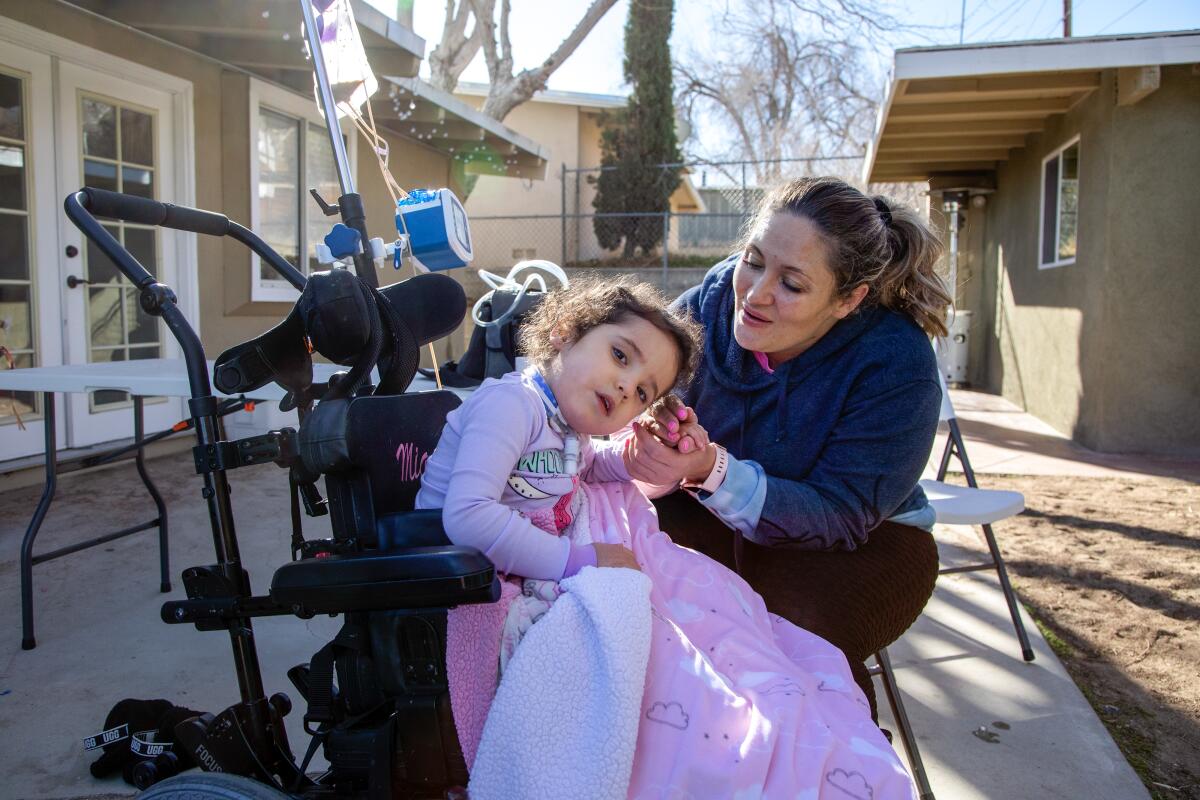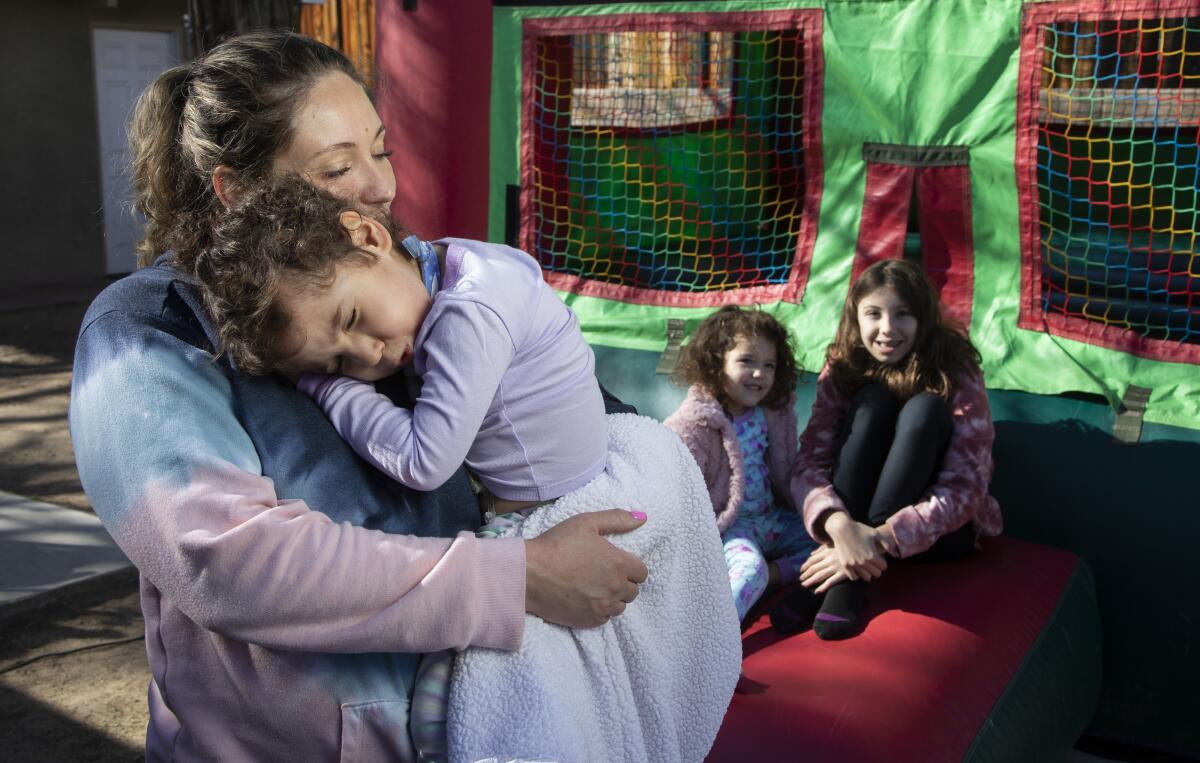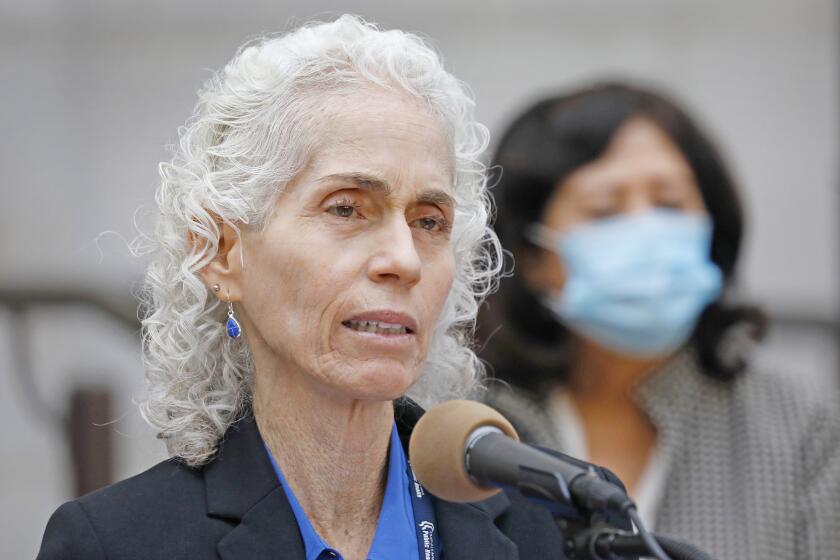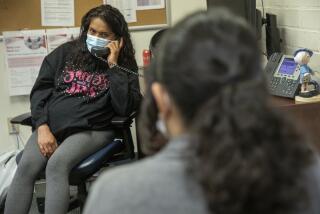‘I don’t have a life’: Parents struggle to get home nurses for medically fragile kids

- Share via
To make sure her 3-year-old daughter survived the night on her ventilator, Amber Suarez stayed awake for four hours, then woke up her husband to watch Mia for another four hours as the girl dozed.
It had already been months since the family lost a nurse who assisted them during the day, which meant Suarez had been caring for her disabled daughter since the morning, juggling the needs of Mia and her twin sister, Savannah. She feeds her through a gastrostomy tube, administers breathing treatments, and suctions out fluid from the tube that helps her breathe.
Mia is also supposed to have a nurse at her side by night, but Suarez said the night nurse hadn’t shown up that Friday. The next night, another nurse missed her scheduled shift, forcing her and her husband to stay up again, Suarez said.
“I’m just so desperate for a break. Just a breather so I can do simple things like cook breakfast, go to the bathroom, shower,” said Suarez, a mother of three in Palmdale. “I can’t leave her alone. She likes to pull out her trach” — the breathing tube surgically inserted into her windpipe. “I’m just trying to keep my daughter alive.”
Families in California have long struggled to get nursing care at home for medically fragile children. Even after doctors have deemed home care necessary to keep their kids healthy and safe, many Californians have been unable to secure enough nurses to fill their allocated hours.
Parents and advocates say that, despite efforts to tackle the problem before the pandemic, it has persisted with the arrival of COVID-19. Home health agencies say it has been harder to hang on to nurses when other businesses are recruiting them to handle new demands tied to the coronavirus, including administering tests and vaccines.
“COVID didn’t create a problem that wasn’t there,” said Jennifer McLelland, a member of the advocacy group Little Lobbyists. “COVID just made everything worse.”
A decade ago, McLelland had so much trouble lining up home nursing for her then-infant son that it took three months before he could be released from the hospital and go home to Fresno County.
The Omicron surge this winter has swamped U.S. hospitals with record numbers of patients with COVID-19.
The family ended up moving from a rural town to the Fresno suburbs to have a better shot at finding nurses for her son, who has a rare genetic condition and has a feeding tube and a tracheostomy. At night, they need to keep reconnecting his ventilator when the 10-year-old rolls over and disconnects the machine in his sleep.
If no nurse is there, “we really just don’t get any sleep,” McLelland said. And “when parents are exhausted, when they’re not getting nights of sleep, the risk of getting things wrong is death.”
Years before the pandemic, the California Department of Health Care Services found in one study that 29% of home nursing hours authorized through a Medi-Cal program for children were not being filled. Another analysis, funded by the home health agency Maxim Healthcare Services, found that the majority of California home health agencies surveyed could only provide a quarter — or less — of the nursing hours approved for their Medi-Cal patients.
Four years ago, attorneys with Disability Rights California and other groups took the state to court, arguing that systemic failures to arrange for home nurses put children at serious risk of injury, hospitalization and institutionalization. The lawsuit centered on children and teens who are authorized to get home nursing through Medi-Cal.
Attorneys ultimately secured a settlement requiring case managers to assist families with getting nurses. Before the pandemic arrived, the state also used money from a cigarette tax to increase its rates for home nursing for children under Medi-Cal, amid complaints from agencies that the rates had been too low to recruit and retain nurses.
Home care for kids, which relies heavily on public funding, “has traditionally lagged behind the other opportunities that nurses have,” said Michael Davidov, president of American United Home Care. Davidov said the Medi-Cal rate increase had helped four years ago, but now “COVID has turbocharged the disparity.”

The gaps in nursing care have made it impossible for many parents to work regular hours and strained families already frazzled by the enduring pandemic. Suarez grows frustrated whenever a nurse fails to show up, but fears that if she lets one go, it will be impossible to find another one.
In the Bay Area, LaTeefah Jenkins said she ultimately resorted to taking her son to the hospital because there was no nurse to help care for him at home during the night. At one point, she said, she was offered a nurse to help during the daytime, but “that didn’t serve me — there’s not very much to do but basic care in those hours.”
Deyonshaj, 14, has multiple conditions including epilepsy and hydrocephalus, a buildup of fluid inside the brain. Without a nurse, Jenkins said she had to quit her job to manage his medications, meals and breathing treatments. When the Fremont mother was still trying to care for her son at home, she slept on the floor in his room.
“I don’t have a life. I can’t even tell you the last time I went to the doctor for myself. There’s no way to pull away,” Jenkins said. “It’s hard for me to be up 10 hours at nighttime, barely getting two hours of sleep. The migraines kick in so bad that I can’t do it anymore.”
Jenkins said she got state authorization to be paid as her son’s home caregiver, but the state will not pay her for that work while he is in the hospital. She is planning to sell off her belongings to scrape together money.
Since April, her son has been in and out of a pediatric hospital, where Jenkins spends her days at his side. “This is where we live,” Jenkins said in a phone call from the hospital. “My goal is to keep my son home. This is not how I want his life to be.”
Dean Chalios, president and chief executive of the California Assn. for Health Services at Home, said that agencies across the state are regularly turning away families who need nursing care for their kids. “We can’t find the nurses to staff those cases — and it’s largely because of a very low reimbursement rate,” Chalios said.
After boosting its rates by 50% 3½ years ago, Medi-Cal began paying agencies $44 an hour for some categories of licensed vocational nurses caring for children at home. Home health agencies said that those rates also cover overhead costs, which means the nurses themselves are making less than that amount.
In Irvine, Megan Miranda sometimes glances at job listings that pay far more than the $28 per hour she is earning to care for a young man who is paralyzed, then feels horrible at the thought of leaving the family who relies on her.
“They were going through nurses every two or three weeks who would quit because of the pay,” said Miranda, a licensed vocational nurse. “I don’t want to be just another nurse who comes and goes when obviously they need the care 24-7.”
Some families have padded rates by paying home nurses a little more themselves, but the gap can be considerable.
Ana Chavez, a licensed vocational nurse living in West Hollywood, said that in the past, she had earned between $20 and $24 per hour as a home health nurse attending to a single pediatric patient.
She said she now earns $45 an hour through a contract to do COVID testing at photo shoots and television productions and has picked up other shifts for as much as $72 an hour. Chavez said she gravitates toward complicated cases, but when she worked in home health, it was nerve-racking knowing that “if there’s an emergency, it’s 100% on you.”
“I liked the work, but I’ve got to be able to pay rent,” Chavez said.
Libertana, an agency that provides care management to families who are supposed to get home nursing, used to be able to fill 95% of the hours approved for its Southern California clients, but the number is now in “the low 80s,” said its executive director, Jonathan Istrin.
“We know a cheese factory in the Central Valley that has an LVN as their occupational nurse on site. What does the nurse do? Test for COVID. Take temperatures. Send people home,” Istrin said. “If you wanted a job, what would you rather do?”
Jeff Shaner, chief operating officer of Aveanna Healthcare, likened nursing care for a medically fragile child to working in an intensive care unit. “This industry was always hard to staff,” Shaner said. “Now it’s nearly impossible.”
Across the healthcare field, there has been “a myth that nurses are leaving in droves,” said Linda Aiken, founding director of the Center for Health Outcomes and Policy Research at the University of Pennsylvania. Research on registered nurses shows they are not abandoning healthcare, but jumping to other jobs in the field with better working conditions, she said.
Nursing homes have observed an extraordinary increase in coronavirus case rates during the Omicron surge. But the number of daily COVID-19 deaths hasn’t risen as dramatically, data show.
“We never find that nurses list their pay as their No. 1 priority in choosing a job,” Aiken added. She pointed out that among the home care agencies she examined in California, more than a fifth were seen by registered nurses as having a poor work environment — another factor that could play an important role in retention.
The California Department of Health Care Services said it is undertaking new efforts under the COVID-19 relief bill to increase the number of care providers for medically fragile children and expand their training. It urged families having trouble getting the Medi-Cal nursing hours that were approved for their children to contact the department.
In Woodland Hills, Dawn Hamilton was notified by her nursing agency in December that her 10-year-old daughter was being discharged as a patient, “due to agency being unable to meet staffing criteria.” Her daughter Emerson has cerebral palsy and needs constant support, including with being fed through a gastrostomy tube, taking her medications and undergoing breathing treatments, and clearing her nose and throat with suctioning.
Last summer, the family lost their home nurse to another job that paid her better, Hamilton said. The nursing agency sent them two candidates since then, neither of whom worked out. One lived too far away to get to their home at needed times.
Except for some hours at school, “I have to literally be with her every second of the day” and keep monitoring her throughout the night, Hamilton said. “If you lose your nurse, there’s probably no one else to help you.”
More to Read
Sign up for Essential California
The most important California stories and recommendations in your inbox every morning.
You may occasionally receive promotional content from the Los Angeles Times.













